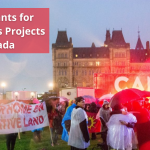
The Rural Transit Solutions Fund is the first federal fund dedicated to developing public transportation in rural and distant areas. It will provide $250 million in government money over five years, beginning in 2021, to assist the development of locally-driven transit options that will help people in rural regions get to work, school, appointments, and see loved ones.
Funding will enable rural, remote, northern, and Indigenous towns and qualifying organizations across Canada to create and deploy new public transit options to their inhabitants, ranging from on-demand services to publicly-owned ride shares and volunteer community carpooling.
The Rural Transit Solutions Fund aims to make it easier for Canadians living in rural and isolated locations to go around daily and interact with adjacent communities. People in rural, remote, northern, and Indigenous regions frequently rely on private vehicles for mobility since they have limited access to public transportation. Furthermore, persons who do not have access to private vehicles or who are unable to drive are cut off from critical services and are unable to travel easily within their town or to neighboring villages.
Eligible candidates can apply for up to $50,000 in planning and design grants, up to $3 million in capital costs (such as the purchase of a vehicle or digital platforms), and up to $5 million in zero-emission transit solutions (such as the purchase of the zero-emission vehicle(s). The Rural Transit Solutions Fund also contributes to reconciliation by enhancing the safety of Indigenous women, girls, and two-spirited people living in rural and isolated locations. Rural Transit Solutions Fund projects that benefit Indigenous populations and communities will receive a minimum of 10% of the total $250 million funding envelope.
Types of a Project that Can Receive Funding Under the Rural Transit Solutions Fund
The Rural Transit Solutions Fund has two funding streams. Eligible applicants can apply for planning and design project funding and contributions to capital projects.
· Project Planning and Design: Planning and design funds assist transit planning efforts and create new solutions, including public involvement, needs assessments, feasibility or viability studies, surveys, and route or mode of travel assessments. These planning and design initiatives are critical in assisting communities in developing projects that may be considered in future intake procedures. INFC plans to increase its capital project intake in the next few years to allow pilot projects to test new rural transit solutions. Eligible applicants can apply for a grant of up to $50,000 from the federal government.
· Capital Projects: Capital Projects can encompass a wide variety of activities related to implementing a project that aids in the delivery of rural transit solutions. Traditional solutions like fixed-route buses, as well as non-traditional solutions like ride-share and on-demand services that require the purchase of minivans, small craft, and zero-emission fleets, shared fleets, the construction of intermodal hubs, the installation of charging stations, or the purchase of software, could be proposed solutions. Eligible candidates will be able to apply for up to $3 million in federal financing to help pay capital costs (such as acquiring a vehicle or developing digital platforms) and up to $5 million in government money to support zero-emission transit after the program is launched.
Who Can Apply?
The Rural Transit Solutions Fund is open to the following organizations:
- Provincial or territorial statutes govern local, regional, and municipal governments and local service districts.
- Territories and provinces (only for capital projects)
- Public sector bodies that are entirely owned by a province, territory, municipal, or regional government and are founded by or under the provincial or territorial statute, regulation, or are wholly owned by a province, territory, municipal, or regional government
- Indigenous government structures
- Organizations assisting Indigenous communities in urban areas and First Nations living off-reserve that are federally or provincially incorporated not-for-profit organizations with a mandate to promote Indigenous outcomes
- Corporations that promote indigenous development
- When applying on behalf of any primary eligible beneficiary, not-for-profit organizations are eligible.
Individuals, private residents, private businesses, and federal entities, such as federal Crown corporations, cannot apply.
A qualified organization can collaborate with a private sector service provider to make a rural transit option a reality. The qualifying organization must retain ownership of the infrastructure or rolling stock for such projects. Applicants must demonstrate how their projects will satisfy the needs of their communities, how they describe themselves as rural, and how their proposals meet the merit criteria due to the diversity of Canadian communities and public transportation demands.

How Are Projects Assessed?
The Rural Transit Solutions Fund is a national direct application program with a competitive process.
For officials to assess the plan, applicants must give appropriate information. Applicants must additionally explain how their suggested planning efforts fit the merit criteria. The following merit criteria will be applied to all eligible projects:
For Planning and Design Projects
Scope- Applicants must provide the following information: How will the planning and design project contribute to developing a concept that might be integrated into the community’s or region’s future growth?
What role will the planning and design project play in developing and implementing a future community initiative?
Need- Applicants must submit the following information:
The community’s demographics.
The present state of the community’s transit programming.
How the planned planning and design project would identify community groups that will benefit from better transit options.
Viability- Applicants must provide the following information: How the planning conclusions will be conveyed to community members to aid in the creation of a community-supported project proposal. The planning process is expected to take a certain amount of time.
Capital Projects
Locally driven- Applicants must meet the following requirements:
Explain how the rural transit option is expected to be supported by the community. This could include letters of support and the participation of local organizations in the project’s preparation and execution.
Describe the many levels of collaboration that have been developed, such as with adjacent communities, regional administration, existing transit groups, and so on.
Include measures to sustain and develop local support, if applicable.
Inclusiveness benefits the local community- Applicants must explain how the rural transit solution will help improve the quality of life and safety of different groups in the community/area and close socio-economic gaps.
Community demand for rural transit solution- Applicants must meet the following requirements:
o Describe the target audience for the service and, if applicable, what transit options are currently available to them. The proposal should include information on the community/area. Please provide sources of information whenever available (e.g., city documents, Statistics Canada, public consultations).
o Describe the community’s/vulnerable area’s demographics and, if applicable, how they presently access transit services.
Key Dates and Deadlines
Applications for the Capital Projects stream will be accepted until April 7, 2022, at midnight Pacific time. Eligible candidates can apply for up to $3 million in capital funding (for example, the purchase of a vehicle or digital platforms) and up to $5 million in zero-emission transit funding (for example, the purchase of a zero-emission vehicle(s). Subsequent application deadlines will be notified at a later time.
Apply Now
Read More: Northern Ontario Travel Grant: Everything You Need To Know







Leave a Reply